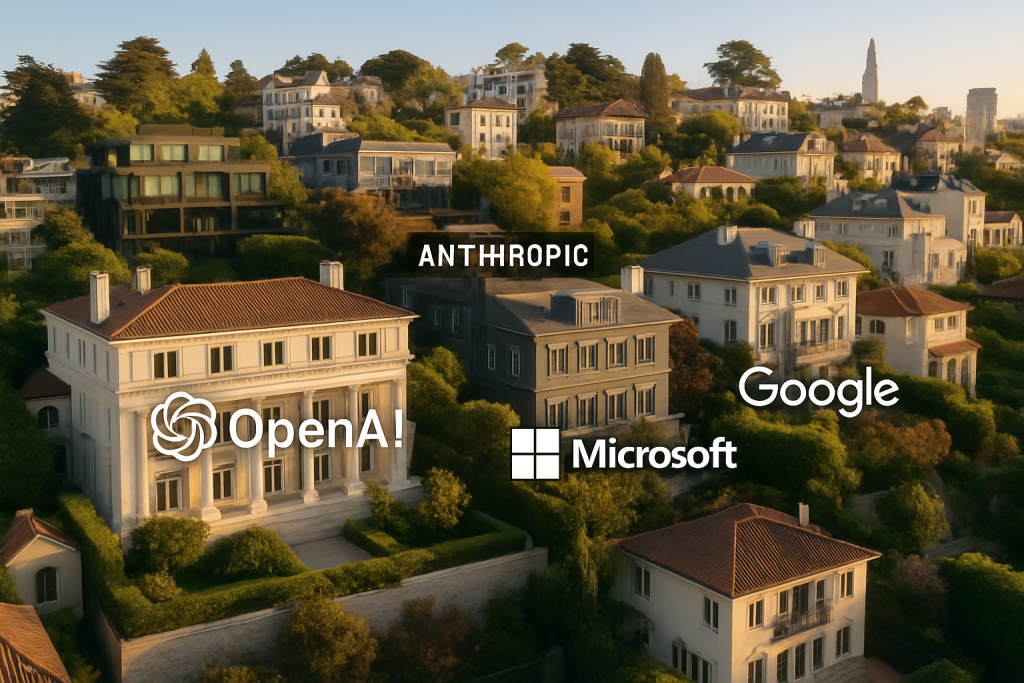San Francisco’s luxury housing market is experiencing its strongest performance in history, with artificial intelligence companies and tech entrepreneurs driving unprecedented demand for ultra-premium properties. According to Sotheby’s International Realty’s 2025 Mid-Year Luxury Outlook, more homes sold above $20 million in San Francisco than any previous year on record.
This dramatic revival marks a stunning turnaround for a market that struggled through pandemic-related cooling and economic uncertainty. The city has transformed into what industry experts call a “magnetic location” for AI entrepreneurs, investors, and engineers willing to pay premium prices for proximity to the world’s fastest-growing technology sector.
Why AI Wealth Is Different This Time
Unlike previous tech booms built on paper wealth, today’s AI surge delivers immediate liquidity through structured secondary share sales and tender offers. Early employees at AI startups can now convert equity into cash, fueling multimillion-dollar property purchases across San Francisco’s most exclusive neighborhoods.
“The thought is that the AI space is going to be the next major source of wealth creation in the global economy,” said Bradley Nelson, Sotheby’s Chief Marketing Officer. “San Francisco became a magnetic location really quickly because entrepreneurs and tech investors needed access to the labor pool with technical expertise.”
OpenAI, the creator of ChatGPT, anchors this transformation from its downtown San Francisco headquarters, joined by dozens of AI startups and research institutions. The tech boom has brought unprecedented cash flow into housing markets, most visibly on Billionaire’s Row where Laurene Powell Jobs reportedly purchased a mansion for $70 million.
Record-Breaking Sales Signal Market Transformation
The numbers tell a compelling story of sustained growth. Beyond San Francisco’s record $20 million-plus sales, New York City saw a 115% boost in homes priced at $10 million or more. This parallel surge across major markets suggests AI’s influence extends far beyond Silicon Valley.
Buyers are making long-term commitments, investing millions in multiyear custom renovations that signal permanent residence plans. These aren’t speculative purchases but strategic moves by industry insiders who view San Francisco real estate as both asset appreciation and networking advantage.
Notable transactions include a $52 million Sea Cliff mansion purchase by a tech executive and multiple off-market deals exceeding previous city records. The luxury sector has emerged as what Sotheby’s calls a “perennial safe haven” amid global economic uncertainty.
Strategic Advantage for Business Leaders
For executives and investors, San Francisco’s AI-driven real estate boom presents clear opportunities. The city offers unmatched access to technical talent, venture capital, and the innovation ecosystem driving artificial intelligence development. Properties near major AI companies provide both lifestyle benefits and potential for significant appreciation.
The convergence creates networking advantages unavailable elsewhere. Industry insiders attend “Cerebral Valley” events one evening and explore multimillion-dollar properties the next, building relationships that drive both business success and real estate values.
Global high-net-worth individuals are doubling down on Bay Area investments, recognizing both immediate opportunity and long-term potential as AI reshapes entire industries. Secondary markets allow early-stage employees to access liquidity, creating a new class of buyers with substantial purchasing power.
Infrastructure and Market Risks
Despite record sales, challenges remain. AI companies require massive computing power, straining electrical grids and cooling systems. JLL research indicates power transmission bottlenecks can delay new developments by up to four years, potentially constraining future growth.
Water demand for cooling systems presents additional concerns, particularly as GPU requirements drive shifts toward liquid cooling technologies. Developers must plan like utilities, incorporating advanced power and cooling infrastructure from initial design phases.
Social equity concerns persist as record-breaking luxury sales highlight growing wealth gaps. Without inclusive reinvestment, the city risks deepening divides between AI-wealthy residents and broader communities struggling with housing affordability.
Global Implications for Tech Hubs
San Francisco’s transformation offers a blueprint for other cities positioning themselves as AI centers. The pattern suggests tech hubs worldwide could experience similar real estate booms as artificial intelligence companies cluster for talent and networking advantages.
Cities competing for AI investment should expect intensified demand for high-quality office space, advanced data center capacity, and luxury housing near innovation districts. Municipal planners must prepare for new asset types and infrastructure requirements that support AI company growth.
The trend extends beyond residential markets. Commercial real estate faces growing demand from AI firms requiring specialized facilities for computing infrastructure and research operations. Cushman & Wakefield reports millions of square feet of AI tenant demand concentrated in major tech markets.
What Business Leaders Should Know
Executives across industries should monitor AI’s real estate impact as a leading indicator of broader economic transformation. Investment patterns in San Francisco suggest artificial intelligence will reshape urban development, property values, and business location strategies globally.
Companies considering AI initiatives should evaluate proximity to talent hubs when making facility decisions. Access to technical expertise increasingly drives location choices, with implications for recruitment, partnerships, and long-term competitiveness.
Real estate professionals should prepare for AI-augmented workflows becoming standard practice. Automated valuation models, predictive analytics, and virtual staging tools are already delivering measurable efficiency gains and improved client experiences.
San Francisco’s luxury market illustrates artificial intelligence’s power to reshape economic landscapes beyond technology sectors. As AI continues expanding, its influence will resonate across industries, requiring strategic foresight in investment and development decisions.
Would you bet on AI transforming real estate markets in your city? Share your view on how artificial intelligence might reshape property values and urban development globally.


